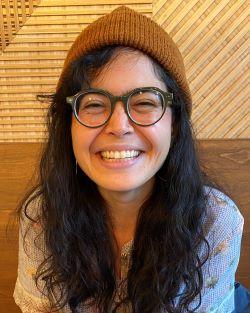The Custodian Project at Three Years: A Conversation with Founder Evalynn Fae Taganna Romano
March 23rd, 2023 is the third anniversary of "Stay Home, Stay Healthy" in Washington State, and is also the third anniversary of the Custodian Project. Last month, the Custodian Project founder, Evalynn Fae Taganna Romano talked with Bridges Center Research Coordinator, Rachel Erstad about the project - how it began and what she imagines may happen in the future.
Watch the video of the discussion here.
Evalynn Fae Taganna Romano is an MPH and MSW graduate from the University of Washington's School of Public Health and School of Social Work. Romano is a Public Health Researcher and a Bereavement Clinician. The Custodian Project is an independent, community-led project with no direct affiliation with the University of Washington or the Bridges Center.
AMPLIFYING CUSTODIANS' VOICES THROUGH THE CUSTODIAN PROJECT
In March of 2020, Evalynn’s mother, who is a custodian at the University of Washington (UW), was facing the uncertainty of continuing work outside the home. In addition, custodians at UW face the daunting task of ensuring clean and safe spaces during a global pandemic. Custodians’ work is difficult and prone to injuries and illness at the best of times. Most custodians are Black, Indigenous, and People of Color (BIPOC) and many are immigrants. Discrimination - including racism, sexual harassment, and psychological harassment, as well as denial or delay of benefits and violations related to pay, are all too common experiences for custodians and janitorial workers.
Romano started the Pan de Sal + Kape (traditional Filipino bread and coffee) Fund to show gratitude for and acknowledge the challenging work of custodians at the UW while supporting local businesses impacted by the pandemic. Romano grew up eating pan de sal and in her culture, like in many cultures, was raised to show appreciation through sharing food. Romano purchased breakfast and grocery gift cards and delivered handmade thank you notes weekly. Local organizations and businesses donated PPE and provided discounts for appropriate footwear. Romano also advocated for custodians to be prioritized for COVID-19 vaccine access. This community-driven, volunteer led effort expanded to include a photography-based storytelling project featuring 16 custodians in the fall of 2020.
This photography project centered the following questions:
- What does your work look like for you? How does your work affect your health?
- What does your home or neighborhood look like for you? How does your home or neighborhood affect your health?
- How can the University of Washington best support your work and health?
The conversations revealed many custodians experience pain in their backs and their feet. They are exposed to chemicals from cleaning and are worried about contracting COVID-19. They experience long commutes and struggle to provide for themselves and their families as Seattle and the surrounding area have become increasingly unaffordable.12 Custodians shared their pride in keeping people healthy and safe yet feel that many do not realize how difficult their work is.
Recommendations emerging from this project include providing custodians fair living wages, linguistically diverse trainings and materials, designated break areas, affordable and accessible public transportation, free parking, proper ergonomic equipment, and appropriate PPE. Custodians’ voices need to be centered in dialogues around working conditions to advance racial justice due to the impacts of systematic racism on BIPOC and immigrant communities.
Public spaces rely on safe and healthy environments maintained by custodians. Change is needed to acknowledge the importance and value of this work. To find out more about the Custodian Project’s past and ongoing efforts to educate the community, and to view galleries from the photography-based storytelling project, please visit the Custodian Project, (www.thecustodianproject.com).
